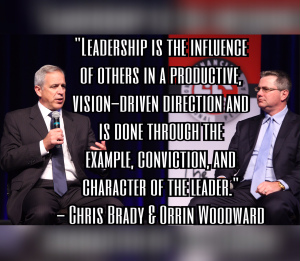The following excerpt was taking from Orrin Woodward and Chris Brady’s New York Times best-selling book, Launching a Leadership Revolution.
What is Leadership?
The concept of “leadership” is a complex one. Most everybody has a feel for what the term means, at least in a general sense, but generalizations about leadership don’t help us very much. In order to understand how to lead and why to lead and what it even means to lead, we’d better get clear on what comprises this complex idea embodied in this simple little English word.
 We’ve tried this exercise of defining leadership with audiences large and small, and invariably the same thing happens. We begin getting word phrases that all sound pretty good, phrases like “taking responsibility” and “getting results,” or one-word descriptors such as “commitment,” “perseverance,” “charisma,” and “integrity.” These are all true in a sense, but somehow they don’t go far enough. So then we switch to attempting definitions by combining all these phrases, but it creates so much mumbo jumbo, like one big buzzword soup from a corporate boardroom. Somehow the words meant something to us individually when thinking about leadership, but when fused together, the life went right out of them.
We’ve tried this exercise of defining leadership with audiences large and small, and invariably the same thing happens. We begin getting word phrases that all sound pretty good, phrases like “taking responsibility” and “getting results,” or one-word descriptors such as “commitment,” “perseverance,” “charisma,” and “integrity.” These are all true in a sense, but somehow they don’t go far enough. So then we switch to attempting definitions by combining all these phrases, but it creates so much mumbo jumbo, like one big buzzword soup from a corporate boardroom. Somehow the words meant something to us individually when thinking about leadership, but when fused together, the life went right out of them.
At this point, it may be helpful to turn to some experts on the subject. Surely they can bring some congruity. The list that follows is just a short offering:
These insights and definitions are good and helpful, and some we like particularly, but John Maxwell gives an exemplary definition, quoted here at length from his book The 21 Irrefutable Laws of Leadership:
Leadership is influence—nothing more, nothing less. People have so many misconceptions about leadership. When they hear that someone has an impressive title or an assigned leadership position, they assume that he is a leader. Sometimes that’s true. But titles don’t have much value when it comes to leading. True leadership cannot be awarded, appointed, or assigned. It comes only from influence, and that can’t be mandated. It must be earned.
What, then, is influence? Our favorite explanation of influence comes to us from nineteenth-century preacher and author Albert Barnes: “Influence is that in a man’s known talents, learning, character, experience, and position, on which a presumption is based that what he holds is true; that what he proposes is wise.”
George Barna tells us, “To be effective, a leader must have influence. But influence is a product of great leadership; it is not synonymous with it. You can have influence in a person’s life without leading him anywhere.”
Perhaps there will never be a short, cute definition for leadership. We are certain there will never be one upon which all “experts” agree. This very difficulty in arriving at a concise explanation for the concept illustrates the enormity of the subject at hand. But all of the above definitions hit near the same mark. Any attempts to be more concise or specific are like trying to grab smoke. For the purpose of this study, then, we will fuse the above commentary into the following:
Leadership is the influence of others in a productive, vision-driven direction
and is done through the example, conviction, and character of the leader.
(Posted by Kristen Seidl, on behalf of Chris Brady)
Share this:




